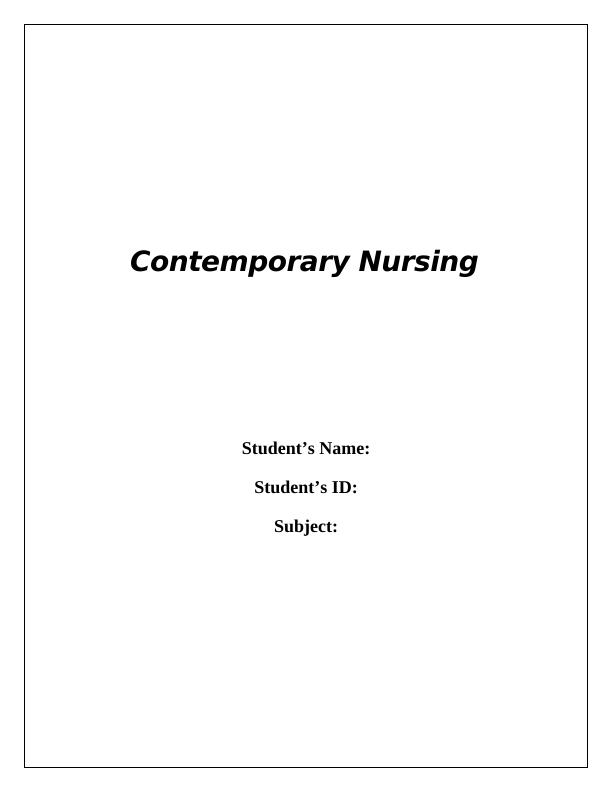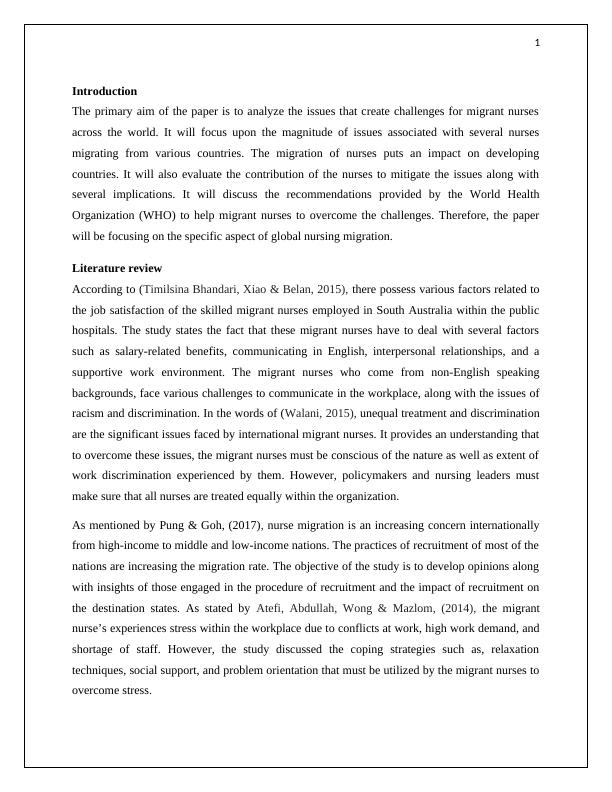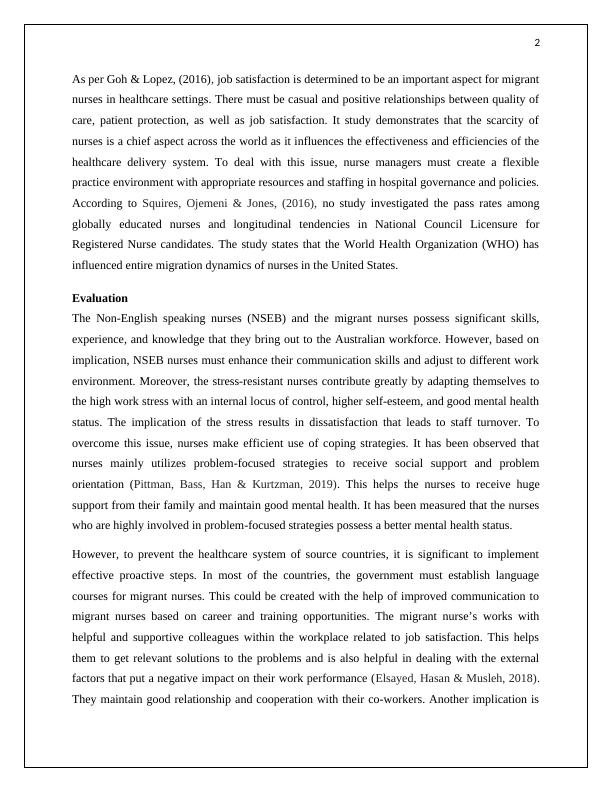Challenges Faced by Migrant Nurses: An Analysis
Added on 2023-06-08
6 Pages1830 Words171 Views
Contemporary Nursing
Student’s Name:
Student’s ID:
Subject:
Student’s Name:
Student’s ID:
Subject:

1
Introduction
The primary aim of the paper is to analyze the issues that create challenges for migrant nurses
across the world. It will focus upon the magnitude of issues associated with several nurses
migrating from various countries. The migration of nurses puts an impact on developing
countries. It will also evaluate the contribution of the nurses to mitigate the issues along with
several implications. It will discuss the recommendations provided by the World Health
Organization (WHO) to help migrant nurses to overcome the challenges. Therefore, the paper
will be focusing on the specific aspect of global nursing migration.
Literature review
According to (Timilsina Bhandari, Xiao & Belan, 2015), there possess various factors related to
the job satisfaction of the skilled migrant nurses employed in South Australia within the public
hospitals. The study states the fact that these migrant nurses have to deal with several factors
such as salary-related benefits, communicating in English, interpersonal relationships, and a
supportive work environment. The migrant nurses who come from non-English speaking
backgrounds, face various challenges to communicate in the workplace, along with the issues of
racism and discrimination. In the words of (Walani, 2015), unequal treatment and discrimination
are the significant issues faced by international migrant nurses. It provides an understanding that
to overcome these issues, the migrant nurses must be conscious of the nature as well as extent of
work discrimination experienced by them. However, policymakers and nursing leaders must
make sure that all nurses are treated equally within the organization.
As mentioned by Pung & Goh, (2017), nurse migration is an increasing concern internationally
from high-income to middle and low-income nations. The practices of recruitment of most of the
nations are increasing the migration rate. The objective of the study is to develop opinions along
with insights of those engaged in the procedure of recruitment and the impact of recruitment on
the destination states. As stated by Atefi, Abdullah, Wong & Mazlom, (2014), the migrant
nurse’s experiences stress within the workplace due to conflicts at work, high work demand, and
shortage of staff. However, the study discussed the coping strategies such as, relaxation
techniques, social support, and problem orientation that must be utilized by the migrant nurses to
overcome stress.
Introduction
The primary aim of the paper is to analyze the issues that create challenges for migrant nurses
across the world. It will focus upon the magnitude of issues associated with several nurses
migrating from various countries. The migration of nurses puts an impact on developing
countries. It will also evaluate the contribution of the nurses to mitigate the issues along with
several implications. It will discuss the recommendations provided by the World Health
Organization (WHO) to help migrant nurses to overcome the challenges. Therefore, the paper
will be focusing on the specific aspect of global nursing migration.
Literature review
According to (Timilsina Bhandari, Xiao & Belan, 2015), there possess various factors related to
the job satisfaction of the skilled migrant nurses employed in South Australia within the public
hospitals. The study states the fact that these migrant nurses have to deal with several factors
such as salary-related benefits, communicating in English, interpersonal relationships, and a
supportive work environment. The migrant nurses who come from non-English speaking
backgrounds, face various challenges to communicate in the workplace, along with the issues of
racism and discrimination. In the words of (Walani, 2015), unequal treatment and discrimination
are the significant issues faced by international migrant nurses. It provides an understanding that
to overcome these issues, the migrant nurses must be conscious of the nature as well as extent of
work discrimination experienced by them. However, policymakers and nursing leaders must
make sure that all nurses are treated equally within the organization.
As mentioned by Pung & Goh, (2017), nurse migration is an increasing concern internationally
from high-income to middle and low-income nations. The practices of recruitment of most of the
nations are increasing the migration rate. The objective of the study is to develop opinions along
with insights of those engaged in the procedure of recruitment and the impact of recruitment on
the destination states. As stated by Atefi, Abdullah, Wong & Mazlom, (2014), the migrant
nurse’s experiences stress within the workplace due to conflicts at work, high work demand, and
shortage of staff. However, the study discussed the coping strategies such as, relaxation
techniques, social support, and problem orientation that must be utilized by the migrant nurses to
overcome stress.

2
As per Goh & Lopez, (2016), job satisfaction is determined to be an important aspect for migrant
nurses in healthcare settings. There must be casual and positive relationships between quality of
care, patient protection, as well as job satisfaction. It study demonstrates that the scarcity of
nurses is a chief aspect across the world as it influences the effectiveness and efficiencies of the
healthcare delivery system. To deal with this issue, nurse managers must create a flexible
practice environment with appropriate resources and staffing in hospital governance and policies.
According to Squires, Ojemeni & Jones, (2016), no study investigated the pass rates among
globally educated nurses and longitudinal tendencies in National Council Licensure for
Registered Nurse candidates. The study states that the World Health Organization (WHO) has
influenced entire migration dynamics of nurses in the United States.
Evaluation
The Non-English speaking nurses (NSEB) and the migrant nurses possess significant skills,
experience, and knowledge that they bring out to the Australian workforce. However, based on
implication, NSEB nurses must enhance their communication skills and adjust to different work
environment. Moreover, the stress-resistant nurses contribute greatly by adapting themselves to
the high work stress with an internal locus of control, higher self-esteem, and good mental health
status. The implication of the stress results in dissatisfaction that leads to staff turnover. To
overcome this issue, nurses make efficient use of coping strategies. It has been observed that
nurses mainly utilizes problem-focused strategies to receive social support and problem
orientation (Pittman, Bass, Han & Kurtzman, 2019). This helps the nurses to receive huge
support from their family and maintain good mental health. It has been measured that the nurses
who are highly involved in problem-focused strategies possess a better mental health status.
However, to prevent the healthcare system of source countries, it is significant to implement
effective proactive steps. In most of the countries, the government must establish language
courses for migrant nurses. This could be created with the help of improved communication to
migrant nurses based on career and training opportunities. The migrant nurse’s works with
helpful and supportive colleagues within the workplace related to job satisfaction. This helps
them to get relevant solutions to the problems and is also helpful in dealing with the external
factors that put a negative impact on their work performance (Elsayed, Hasan & Musleh, 2018).
They maintain good relationship and cooperation with their co-workers. Another implication is
As per Goh & Lopez, (2016), job satisfaction is determined to be an important aspect for migrant
nurses in healthcare settings. There must be casual and positive relationships between quality of
care, patient protection, as well as job satisfaction. It study demonstrates that the scarcity of
nurses is a chief aspect across the world as it influences the effectiveness and efficiencies of the
healthcare delivery system. To deal with this issue, nurse managers must create a flexible
practice environment with appropriate resources and staffing in hospital governance and policies.
According to Squires, Ojemeni & Jones, (2016), no study investigated the pass rates among
globally educated nurses and longitudinal tendencies in National Council Licensure for
Registered Nurse candidates. The study states that the World Health Organization (WHO) has
influenced entire migration dynamics of nurses in the United States.
Evaluation
The Non-English speaking nurses (NSEB) and the migrant nurses possess significant skills,
experience, and knowledge that they bring out to the Australian workforce. However, based on
implication, NSEB nurses must enhance their communication skills and adjust to different work
environment. Moreover, the stress-resistant nurses contribute greatly by adapting themselves to
the high work stress with an internal locus of control, higher self-esteem, and good mental health
status. The implication of the stress results in dissatisfaction that leads to staff turnover. To
overcome this issue, nurses make efficient use of coping strategies. It has been observed that
nurses mainly utilizes problem-focused strategies to receive social support and problem
orientation (Pittman, Bass, Han & Kurtzman, 2019). This helps the nurses to receive huge
support from their family and maintain good mental health. It has been measured that the nurses
who are highly involved in problem-focused strategies possess a better mental health status.
However, to prevent the healthcare system of source countries, it is significant to implement
effective proactive steps. In most of the countries, the government must establish language
courses for migrant nurses. This could be created with the help of improved communication to
migrant nurses based on career and training opportunities. The migrant nurse’s works with
helpful and supportive colleagues within the workplace related to job satisfaction. This helps
them to get relevant solutions to the problems and is also helpful in dealing with the external
factors that put a negative impact on their work performance (Elsayed, Hasan & Musleh, 2018).
They maintain good relationship and cooperation with their co-workers. Another implication is

End of preview
Want to access all the pages? Upload your documents or become a member.
Related Documents
Annotated Bibliography on Job Satisfaction and Work Environment among Nursing Professionalslg...
|6
|1230
|161
Health Workforce Issue 2022lg...
|10
|1937
|12
Nursing Staffing Shortage.lg...
|7
|1148
|41
Management in Health Care Practice: Workplace Violence and Dealing with Difficult Peoplelg...
|11
|2857
|55
Multicultural and Multilingual Environmentlg...
|5
|1436
|12
International Nursing Reviewlg...
|9
|2593
|263
